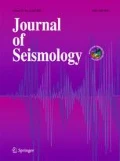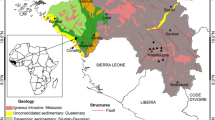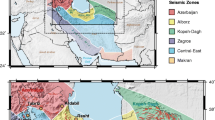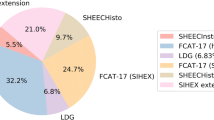Abstract
While there has been significant research on probabilistic seismic hazard analysis (PSHA) using several different seismic sources, this paper focuses particularly on understanding the spatially varying seismic hazard controlled only by earthquakes. In that vein, regarding Turkish seismicity, this study is the first of its kind to explore this conundrum from a Bayesian point of view and offer new estimates to compare with the existing ones. In this study, a national-extent peak ground acceleration (PGA)–driven hazard map (upon 90% quantile of maxima, VS30 = 760 m/s, and a return period of 475 years) was created and then compared both with the old and new versions of the officially recognized seismic hazard maps of Turkey. Regarding 10 earthquake-prone cities, the new PGA estimates were compared with those picked from these two maps. Next, individual site-based hazard estimates were drawn for these city centers considering the return periods of 43, 72, 140, and 475 years. The present hazard map was in compliance with the seismotectonic setup of Turkey and its PGA estimates were slightly high compared with the last two hazard maps for some specific regions, most of which are located in major active fault zones with a history of intense seismic activity, albeit the figures for low seismic zones were relatively low. With this study, it becomes clear that the process of PSHA, which innately requires a long and tiresome effort, can instantaneously be performed against the changing of catalog data over time, and thence prompt evaluations on variations can consequently be made.








Similar content being viewed by others
References
AFAD (2018) Earthquake hazard map of Turkey. The Disaster and Emergency Management Authority of Turkey
Akkar S et al (2018a) Evolution of seismic hazard maps in Turkey. Bull Earthq Eng 16:3197–3228. https://doi.org/10.1007/s10518-018-0349-1
Akkar S, Çağnan Z (2010) A local ground-motion predictive model for Turkey, and its comparison with other regional and global ground-motion models. Bull Seismol Soc Am 100:2978–2995. https://doi.org/10.1785/0120090367
Akkar S, Çağnan Z, Yenier E, Erdoğan Ö, Sandıkkaya MA, Gülkan P (2010) The recently compiled Turkish strong motion database: preliminary investigation for seismological parameters. J Seismol 14:457–479. https://doi.org/10.1007/s10950-009-9176-9
Akkar S, Kale Ö, Yakut A, Çeken U (2018b) Ground-motion characterization for the probabilistic seismic hazard assessment in Turkey. Bull Earthq Eng 16:3439–3463. https://doi.org/10.1007/s10518-017-0101-2
Akkar S, Sandıkkaya MA, Bommer JJ (2014) Empirical ground-motion models for point- and extended-source crustal earthquake scenarios in Europe and the Middle East. Bull Earthq Eng 12:359–387. https://doi.org/10.1007/s10518-013-9461-4
Aktug B, Dikmen U, Dogru A, Ozener H (2013) Seismicity and strain accumulation around Karliova triple junction (Turkey). J Geodyn 67:21–29. https://doi.org/10.1016/j.jog.2012.04.008
Allen CR (1982) Comparisons between the North Anatolian Fault of Turkey and the San Andreas Fault of California. In: Işikara AM, Vogel A (eds) Multidisciplinary approach to earthquake prediction: Proceedings of the International Symposium on Earthquake Prediction in the North Anatolian Fault Zone held in Istanbul, March 31–April 5, 1980. Vieweg+Teubner Verlag, Wiesbaden, pp 67–85. https://doi.org/10.1007/978-3-663-14015-3_5
Altiner Y, Söhne W, Güney C, Perlt J, Wang R, Muzli M (2013) A geodetic study of the 23 October 2011 Van, Turkey earthquake. Tectonophysics 588:118–134. https://doi.org/10.1016/j.tecto.2012.12.005
Ambraseys NN, Jackson JA (2000) Seismicity of the Sea of Marmara (Turkey) since 1500. Geophys J Int 141:F1–F6. https://doi.org/10.1046/j.1365-246x.2000.00137.x
Badgley PC (1965) Structural and tectonic principles Harper & Row, New York
Barka A (1992) The north Anatolian fault zone. In: Annales tectonicae, . vol Suppl. pp 164–195
Bayrak Y, Türker T (2016) The determination of earthquake hazard parameters deduced from bayesian approach for different seismic source regions of Western Anatolia. Pure Appl Geophys 173:205–220. https://doi.org/10.1007/s00024-015-1078-x
Bayrak Y, Türker T (2017) Evaluating of the earthquake hazard parameters with Bayesian method for the different seismic source regions of the North Anatolian Fault Zone. Nat Hazards 85:379–401. https://doi.org/10.1007/s11069-016-2569-5
Bommer JJ (2012) Challenges of building logic trees for probabilistic seismic hazard analysis. Earthquake Spectra 28:1723–1735. https://doi.org/10.1193/1.4000079
Bozkurt E (2001) Neotectonics of Turkey–a synthesis. Geodin Acta 14:3–30
BSSC (2001) NEHRP recommended provisions for seismic regulations for new buildings and other structures, FEMA-368, Part 1 (Provisions): developed for the Federal Emergency Management Agency. Building Seismic Safety Council, FEMA, Washington
Campbell KW (1982) Bayesian analysis of extreme earthquake occurrences. Part I. Probabilistic hazard model. Bull Seismol Soc Am 72:1689–1705
Campbell KW (1983) Bayesian analysis of extreme earthquake occurrences. Part II. Application to the San Jacinto fault zone of southern California. Bull Seismol Soc Am 73:1099–1115
Chiou B-J, Youngs RR (2008) An NGA model for the average horizontal component of peak ground motion and response spectra. Earthquake Spectra 24:173–215. https://doi.org/10.1193/1.2894832
Cornell CA (1968) Engineering seismic risk analysis. Bull Seismol Soc Am 58:1583–1606
Cox DR, Lewis PAW (1966) The statistical analysis of series of events. Methuen’s monographs on applied probability and statistics. John Wiley, London
Delph JR, Biryol CB, Beck SL, Zandt G, Ward KM (2015) Shear wave velocity structure of the Anatolian plate: anomalously slow crust in southwestern Turkey. Geophys J Int 202:261–276. https://doi.org/10.1093/gji/ggv141
Demircioğlu MB, Şeşetyan K, Duman TY, Çan T, Tekin S, Ergintav S (2018) A probabilistic seismic hazard assessment for the Turkish territory: part II—fault source and background seismicity model. Bull Earthq Eng 16:3399–3438. https://doi.org/10.1007/s10518-017-0130-x
Dewey JF, Hempton MR, Kidd WSF, Saroglu F, Şengör AMC (1986) Shortening of continental lithosphere: the neotectonics of Eastern Anatolia — a young collision zone Geological Society, 19th edn. Special Publications, London, pp 1–36. https://doi.org/10.1144/gsl.sp.1986.019.01.01
Duman TY et al (2016) Seismotectonic database of Turkey. Bull Earthq Eng 16:3277–3316. 1-40. https://doi.org/10.1007/s10518-016-9965-9
Duman TY et al (2018) Seismotectonic database of Turkey. Bull Earthq Eng 16:3277–3316. https://doi.org/10.1007/s10518-016-9965-9
Duman TY, Emre O (2013) The East Anatolian Fault: geometry, segmentation and jog characteristics vol 372. doi:https://doi.org/10.1144/SP372.14
Elliott JR, Copley AC, Holley R, Scharer K, Parsons B (2013) The 2011 Mw 7.1 Van (Eastern Turkey) earthquake. J Geophys Res Solid Earth 118:1619–1637. https://doi.org/10.1002/jgrb.50117
Emre Ö, Duman TY, Özalp S, Elmacı H, Olgun Ş, Şaroğlu F (2013) Active fault map of Turkey with an explanatory text. General Directorate of Mineral Research and Exploration, Ankara-Turkey
Emre Ö, Duman TY, Özalp S, Şaroğlu F, Olgun Ş, Elmacı H, Çan T (2018) Active fault database of Turkey. Bull Earthq Eng 16:3229–3275. https://doi.org/10.1007/s10518-016-0041-2
EPRI (2004) CEUS ground motion project final report 1009684. Electric Power Research Institute, Palo Alto
Eroglu Azak T, Kalafat D, Şeşetyan K, Demircioğlu MB (2017) Effects of seismic declustering on seismic hazard assessment: a sensitivity study using the Turkish earthquake catalogue. Bull Earthq Eng. https://doi.org/10.1007/s10518-017-0174-y
Eroglu Azak T, Kalafat D, Şeşetyan K, Demircioğlu MB (2018) Effects of seismic declustering on seismic hazard assessment: a sensitivity study using the Turkish earthquake catalogue. Bull Earthq Eng 16:3339–3366. https://doi.org/10.1007/s10518-017-0174-y
Galanis OC, Tsapanos T, Papadopoulos G, Kiratzi A (2002) Bayesian extreme values distribution for seismicity parameters assessment in South America. J Balkan Geophys Soc 5:77–86
García D, Singh SK, Herráiz M, Ordaz M, Pacheco JF (2005) Inslab earthquakes of central Mexico: peak ground-motion parameters and response spectra. Bull Seismol Soc Am 95:2272–2282. https://doi.org/10.1785/0120050072
Gardner JK, Knopoff L (1974) Is the sequence of earthquakes in Southern California, with aftershocks removed, Poissonian? Bull Seismol Soc Am 64:1363–1367
Guidoboni E, Comastri A, Traina G, Geofisica RINd (1994) Catalogue of ancient earthquakes in the Mediterranean area up to the 10th century. Istituto nazionale di geofisica Rome,
Gutenberg B, Richter CF (1944) Frequency of earthquakes in California. Bull Seismol Soc Am 34:185–188
Gülkan P, Koçyiğit A, Yücemen MS, Doyuran V, Başöz N (1993) A seismic zones map of Turkey derived from recent data. METU Civil Engineering Dept. Earthquake Engineering Research Center,
Härdle W (1990) Applied nonparametric regression. vol 19. Cambridge university press,
Harrison RW A (2008) model for the plate tectonic evolution of the eastern Mediterranean region that emphasizes the role of transform (strike-slip) structures. In: 1st WSEAS International Conference on Environmental and Geological Science and Engineering (EG’08) Malta
Hässig M, Duretz T, Rolland Y, Sosson M (2016) Obduction of old oceanic lithosphere due to reheating and plate reorganization: insights from numerical modelling and the NE Anatolia – Lesser Caucasus case example. J Geodyn 96:35–49. https://doi.org/10.1016/j.jog.2016.02.007
Hussain E, Wright TJ, Walters RJ, Bekaert DPS, Lloyd R, Hooper A (2018) Constant strain accumulation rate between major earthquakes on the North Anatolian Fault. Nat Commun 9:1392. https://doi.org/10.1038/s41467-018-03739-2
Jackson J (1994) Active tectonics of the Aegean region. Annu Rev Earth Planet Sci 22:239–271. https://doi.org/10.1146/annurev.ea.22.050194.001323
Joyner WB, Boore DM (1981) Peak horizontal acceleration and velocity from strong-motion records including records from the 1979 imperial valley California earthquake. Bull Seismol Soc Am 71:2011–2038
Kadirioğlu FT, Kartal RF (2016) The new empirical magnitude conversion relations using an improved earthquake catalogue for Turkey and its near vicinity (1900–2012). Turk J Earth Sci 25:300–310. https://doi.org/10.3906/yer-1511-7
Kadirioğlu FT et al (2016) An improved earthquake catalogue (M ≥ 4.0) for Turkey and its near vicinity (1900–2012). Bull Earthq Eng 16(8):3317–3338. 1-22. https://doi.org/10.1007/s10518-016-0064-8
Kalafat D, Güneş Y, Kekovali K, Kara M, Deniz P, Yilmazer M (2011) A revised and extended earthquake catalogue for Turkey since 1900 ( M ≥ 4.0), Boğaziçi University, Kandilli Observatory and Earthquake Research Institute (KOERI), Bebek-Istanbul
Kale Ö, Akkar S (2013) A new procedure for selecting and ranking ground-motion prediction equations (GMPEs): the Euclidean distance-based ranking (EDR) method. Bull Seismol Soc Am 103:1069–1084. https://doi.org/10.1785/0120120134
Kelly D, Smith C (2011) Bayesian inference for probabilistic risk assessment: a practitioner’s guidebook. Springer Science & Business Media,
Koçyiğit A, Yilmaz A, Adamia S, Kuloshvili S (2001) Neotectonics of East Anatolian Plateau (Turkey) and Lesser Caucasus: implication for transition from thrusting to strike-slip faulting. Geodin Acta 14:177–195. https://doi.org/10.1080/09853111.2001.11432443
Konca AO (2015) Rupture process of 2011 Mw7.1 Van, Eastern Turkey earthquake from joint inversion of strong-motion, high-rate GPS, teleseismic, and GPS data. J Seismol 19:969–988. https://doi.org/10.1007/s10950-015-9506-z
Leptokaropoulos KM, Karakostas VG, Papadimitriou EE, Adamaki AK, Tan O, İnan S (2013) A homogeneous earthquake catalog for Western Turkey and magnitude of completeness determination. Bull Seismol Soc Am 103:2739–2751. https://doi.org/10.1785/0120120174
Lyubushin AA, Parvez IA (2010) Map of seismic hazard of India using Bayesian approach. Nat Hazards 55:543–556. https://doi.org/10.1007/s11069-010-9546-1
Lyubushin AA, Tsapanos TM, Pisarenko VF, Koravos GC (2002) Seismic hazard for selected sites in Greece: a Bayesian estimate of seismic peak ground acceleration. Nat Hazards 25:83–98. https://doi.org/10.1023/a:1013342918801
McClusky S et al (2000) Global Positioning System constraints on plate kinematics and dynamics in the eastern Mediterranean and Caucasus. J Geophys Res Solid Earth 105:5695–5719. https://doi.org/10.1029/1999JB900351
McCuen RH, Knight Z, Cutter AG (2006) Evaluation of the Nash–Sutcliffe Efficiency Index 11:597-602 https://doi.org/10.1061/(ASCE)1084-0699(2006)11:6(597)
McGuire RK (2004) Seismic hazard and risk analysis. Earthquake Engineering Research Institute,
McKenzie D (1972) Active tectonics of the Mediterranean region. Geophys J R Astron Soc 30:109–185. https://doi.org/10.1111/j.1365-246X.1972.tb02351.x
McKenzie D (1976) The East Anatolian Fault: a major structure in Eastern Turkey. Earth Planet Sci Lett 29:189–193. https://doi.org/10.1016/0012-821X(76)90038-8
Megawati K, Pan T-C (2010) Ground-motion attenuation relationship for the Sumatran megathrust earthquakes. Earthq Eng Struct Dyn 39:827–845. https://doi.org/10.1002/eqe.967
Mohammadi H, Türker T, Bayrak Y (2016) A quantitative appraisal of earthquake hazard parameters evaluated from Bayesian approach for different regions in Iranian Plateau. Pure Appl Geophys 173:1971–1991. https://doi.org/10.1007/s00024-016-1264-5
Mortgat CP, Shah HC (1979) A Bayesian model for seismic hazard mapping. Bull Seismol Soc Am 69:1237–1251
Nas M, Jalilian A, Bayrak Y (2019) Spatiotemporal comparison of declustered catalogs of earthquakes in Turkey. Pure Appl Geophys 176:2215–2233. https://doi.org/10.1007/s00024-018-2081-9
Nash JE, Sutcliffe JV (1970) River flow forecasting through conceptual models part I — a discussion of principles. J Hydrol 10:282–290. https://doi.org/10.1016/0022-1694(70)90255-6
Pichon XL, Kreemer C (2010) The Miocene-to-present kinematic evolution of the Eastern Mediterranean and Middle East and its implications for dynamics. Annu Rev Earth Planet Sci 38:323–351. https://doi.org/10.1146/annurev-earth-040809-152419
Pisarenko V, Lyubushin A (1999) A Bayesian approach to seismic hazard estimation: maximum values of magnitudes and peak ground accelerations. Earthq Res China 45–57
Pisarenko VF, Lyubushin AA (1997) Statistical estimation of maximum peak ground acceleration at a given point of a seismic region. J Seismol 1:395–405. https://doi.org/10.1023/a:1009795503733
Pisarenko VF, Lyubushin AA, Lysenko VB, Golubeva TV (1996) Statistical estimation of seismic hazard parameters: maximum possible magnitude and related parameters. Bull Seismol Soc Am 86:691–700
Rao CR (1965) Linear statistical inference and its applications. John Wiley & Sons,
Reilinger R et al. (2006) GPS constraints on continental deformation in the Africa-Arabia-Eurasia continental collision zone and implications for the dynamics of plate interactions. J Geophys Res: Solid Earth 111. https://doi.org/10.1029/2005JB004051
Reilinger RE et al (1997) Global Positioning System measurements of present-day crustal movements in the Arabia-Africa-Eurasia plate collision zone. J Geophys Res Solid Earth 102:9983–9999. https://doi.org/10.1029/96JB03736
Rong Y, Mahdyiar M, Shen-Tu B, Shabestari K (2011) Magnitude problems in historical earthquake catalogues and their impact on seismic hazard assessment. Geophys J Int 187:1687–1698. https://doi.org/10.1111/j.1365-246X.2011.05226.x
Royden LH (1993) Evolution of retreating subduction boundaries formed during continental collision. Tectonics 12:629–638. https://doi.org/10.1029/92TC02641
Ruzhich VV, Levina EA, Pisarenko VF, Lyubushin AA (1998) Statistic estimation of the maximum possible earthquake magnitude for the Baikal Rift Zone. Geol Geofiz 39:1445–1457
Salahshoor H, Lyubushin A, Shabani E, Kazemian J (2018) Comparison of Bayesian estimates of peak ground acceleration (Amax) with PSHA in Iran. J Seismol 22:1515–1527. https://doi.org/10.1007/s10950-018-9782-5
Saroglu F, Emre O, Kuscu I (1992) The East Anatolian Fault Zone of Turkey. Annales Tectonicae 6:99–125
Scherbaum F, Bommer JJ, Bungum H, Cotton F, Abrahamson NA (2005) Composite ground-motion models and logic trees: methodology, sensitivities, and uncertainties. Bull Seismol Soc Am 95:1575–1593. https://doi.org/10.1785/0120040229
Scherbaum F, Cotton F, Smit P (2004) On the use of response spectral-reference data for the selection and ranking of ground-motion models for seismic-hazard analysis in regions of moderate seismicity: the case of rock motion. Bull Seismol Soc Am 94:2164–2185. https://doi.org/10.1785/0120030147
Scherbaum F, Delavaud E, Riggelsen C (2009) Model selection in seismic hazard analysis: an information-theoretic perspective. Bull Seismol Soc Am 99:3234–3247. https://doi.org/10.1785/0120080347
Scherbaum F, Kuehn NM (2011) Logic tree branch weights and probabilities: summing up to one is not enough. Earthquake Spectra 27:1237–1251. https://doi.org/10.1193/1.3652744
Shebalin NV, Leydecker G, Mokrushina NG, Tatevossian RE, Erteleva OO, Vassiliev Y-V (1998) Earthquake catalogue for central and southeastern Europe 342 BC - 1990 AD. Commission of the European Union, Brussels
Softa M, Emre T, Sözbilir H, Spencer JQG, Turan M (2018) Geomorphic evidence for active tectonic deformation in the coastal part of Eastern Black Sea, Eastern Pontides, Turkey. Geodin Acta 30:249–264. https://doi.org/10.1080/09853111.2018.1494776
Softa M, Emre T, Sözbilir H, Spencer JQG, Turan M (2019) Field evidence for Southeast Black Sea Fault of Quaternary age and its tectonic implications, Eastern Pontides, Turkey. Geol Bull Turkey 62:17–40
Sosson M et al (2016) The eastern Black Sea-Caucasus region during the Cretaceous: new evidence to constrain its tectonic evolution. Compt Rendus Geosci 348:23–32. https://doi.org/10.1016/j.crte.2015.11.002
Soysal H, Sipahioğlu S, Kolçak D, Altınok Y (1981) Historical earthquake catalogue of Turkey and surrounding area (2100 BC–1900 AD). Scientific and Technological Research Council of Turkey (TUBITAK), Istanbul, Turkey
Stucchi M et al (2013) The SHARE European Earthquake Catalogue (SHEEC) 1000–1899. J Seismol 17:523–544. https://doi.org/10.1007/s10950-012-9335-2
Şengör AMC (2014) Triple junction. In: Harff J, Meschede M, Petersen S, Thiede J (eds) Encyclopedia of marine geosciences. Springer Netherlands, Dordrecht, pp 1–13. https://doi.org/10.1007/978-94-007-6644-0_122-2
Şengör AMC, Yilmaz Y (1981) Tethyan evolution of Turkey: a plate tectonic approach. Tectonophysics 75:181–241. https://doi.org/10.1016/0040-1951(81)90275-4
Şengör AMC, Görür N, Şaroğlu F (eds) (1985) Strike-slip faulting and related basin formation in zones of tectonic escape: Turkey as a case study vol 37. Strike-slip deformation, basin formation, and sedimentation Society of Economic Paleontologists and Mineralogists Special Publication,
Şengör AMC, Tüysüz O, İmren C, Sakınç M, Eyidoğan H, Görür N, le Pichon X, Rangin C (2005) The North Anatolian Fault: a new look. Annu Rev Earth Planet Sci 33:37–112. https://doi.org/10.1146/annurev.earth.32.101802.120415
Şengör AMC, Yilmaz Y, Sungurlu O (1984) The geological evolution of the Eastern Mediterranean. Blackwell Scientific Publications, Palo Alto
Şeşetyan K, Demircioglu MB, Duman TY, Çan T, Tekin S, Azak TE, Fercan ÖZ (2018) A probabilistic seismic hazard assessment for the Turkish territory—part I: the area source model. Bull Earthq Eng 16:3367–3397. https://doi.org/10.1007/s10518-016-0005-6
Tan O, Tapirdamaz MC, Yörük A (2008) The earthquake catalogues for Turkey. Turk J Earth Sci 17:405–418
Tatar O, Akpınar Z, Gürsoy H, Piper JDA, Koçbulut F, Mesci BL, Polat A, Roberts AP (2013) Palaeomagnetic evidence for the neotectonic evolution of the Erzincan Basin, North Anatolian Fault Zone. Turkey Journal of Geodynamics 65:244–258. https://doi.org/10.1016/j.jog.2012.03.009
Tsapanos TM (2003) Appraisal of seismic hazard parameters for the seismic regions of the east circum-Pacific belt inferred from a Bayesian approach. Nat Hazards 30:59–78. https://doi.org/10.1023/a:1025051712052
Tsapanos TM, Christova CV (2003) Earthquake hazard parameters in Crete Island and its surrounding area inferred from Bayes statistics: an integration of morphology of the seismically active structures and seismological data. Pure Appl Geophys 160:1517–1536. https://doi.org/10.1007/s00024-003-2358-4
Tsapanos TM, Lyubushin AA, Pisarenko VF (2001) Application of a Bayesian approach for estimation of seismic hazard parameters in some regions of the circum-pacific belt. Pure Appl Geophys 158:859–875
Turkelli N et al (2003) Seismogenic zones in Eastern. Turkey Geophys Res Lett 30:n/a. https://doi.org/10.1029/2003GL018023
Tuyen NH, Lu NT (2012) Recognition of earthquake-prone nodes, a case study for North Vietnam (M ⩾ 5.0). Geodesy Geodyn 3:14–26. https://doi.org/10.3724/SP.J.1246.2012.00014
Utkucu M (2013) 23 October 2011 Van, Eastern Anatolia, earthquake (MW7.1) and seismotectonics of Lake Van area. J Seismol 17:783–805. https://doi.org/10.1007/s10950-012-9354-z
Vialon P, Ruhland M, Grolier J (1976) Eléments de tectonique analytique. Masson Paris
Westaway R (1994) Present-day kinematics of the Middle East and eastern Mediterranean. J Geophys Res Solid Earth 99:12071–12090. https://doi.org/10.1029/94jb00335
Wilcox RE, Harding TP, Seely DR (1973) Basic wrench tectonics. AAPG Bull 57:74–96
Yadav RBS, Tsapanos TM, Bayrak Y, Koravos GC (2013a) Probabilistic appraisal of earthquake hazard parameters deduced from a Bayesian approach in the northwest frontier of the Himalayas. Pure Appl Geophys 170:283–297. https://doi.org/10.1007/s00024-012-0488-2
Yadav RBS, Tsapanos TM, Tripathi JN, Chopra S (2013b) An evaluation of tsunami hazard using Bayesian approach in the Indian Ocean. Tectonophysics 593:172–182. https://doi.org/10.1016/j.tecto.2013.03.004
Yaghmaei-Sabegh S (2012) A new method for ranking and weighting of earthquake ground-motion prediction models. Soil Dyn Earthq Eng 39:78–87. https://doi.org/10.1016/j.soildyn.2012.03.006
Yılmaz Y, Tüysüz O, Yiğitbaş E, Genç ŞC, Şengör AMC (1997) Geology and tectonic evolution of the Pontides. In: Robinson AG (ed) Regional and petroleum geology of the Black Sea and surrounding regions, vol 68. The American Association of Petroleum Geologists Memoir, pp 183–226
Acknowledgments
The authors would like to thank the anonymous reviewers for their critical and constructive comments that greatly contributed to improving the final version of the paper. They also thank the handling Editor (Prof. Andrzej Kijko) for his assistance during the review process. The corresponding author of this paper would also like to thank the Karadeniz Technical University for giving the great opportunity to use the IT labs and ArcGIS software during the creation process of some maps expressed in this study.
Author information
Authors and Affiliations
Corresponding author
Ethics declarations
Conflict of interest
The authors declare that they have no conflict of interest.
Additional information
Publisher’s note
Springer Nature remains neutral with regard to jurisdictional claims in published maps and institutional affiliations.
Rights and permissions
About this article
Cite this article
Nas, M., Lyubushin, A., Softa, M. et al. Comparative PGA-driven probabilistic seismic hazard assessment (PSHA) of Turkey with a Bayesian perspective. J Seismol 24, 1109–1129 (2020). https://doi.org/10.1007/s10950-020-09940-5
Received:
Accepted:
Published:
Issue Date:
DOI: https://doi.org/10.1007/s10950-020-09940-5




